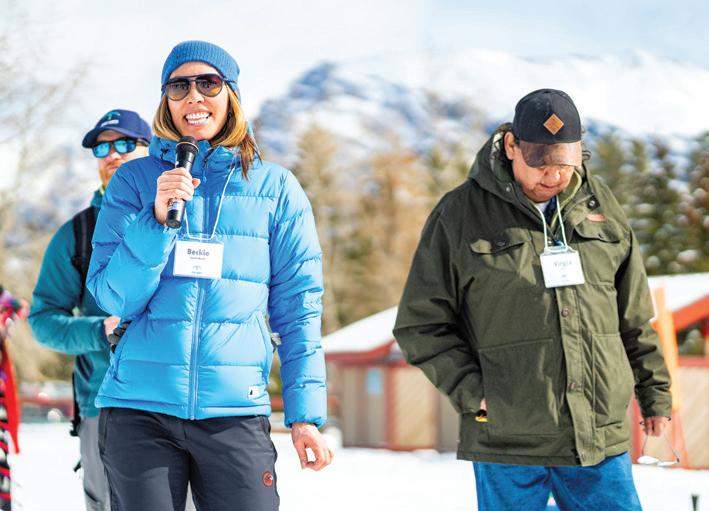
4 minute read
Spirit North: Uplifting Indigenous Youth Through Sport
Spirit North: Uplifting Indigenous Youth Through Sport
When Olympian Beckie Scott retired from cross-country skiing, she knew she wanted to continue working in sports. After participating in three Olympic games—1998 in Nagano, Japan, 2002 in Salt Lake City, Utah, and 2006 in Turin, Italy—she became Canada’s most decorated cross-country ski racer in the history of the sport.
With a strong connection to sport and her home province of Alberta, Scott became an ambassador for a learn-to-ski program that was starting in First Nations and Métis communities in northern Alberta. Travelling through remote Indigenous communities in Canada’s north, she realized not only how difficult it was for Indigenous youth to get involved in sport but also how much being involved meant to them.
“I began travelling to a number of remote Indigenous communities as part of the program, and with each trip, I had my eyes opened to the disparity and harsh realities of life for Indigenous communities,” Scott explained. “I was particularly troubled by the barriers around access to sport and activity for kids, which I had accessed so easily and readily as a child. In this country of wealth, opportunity, and seemingly endless activity options, it just struck me as profoundly unjust and deeply unfair.”
When the Truth and Reconciliation Commission report was released in 2015, Scott followed the recommendations closely. She knew she wanted to help—and the way she knew how was through sport.
That journey is what led her to start Spirit North, a charitable organization that uses land-based activities to improve the health and well-being of Indigenous youth to empower them in things like sport, school, and life.
Land-based activities are a big part of what the organization focuses on—meaning that youth can participate in place-specific activities that help them feel a connection to the land they’re on.
“We prioritize land-based activities because of the connection that being outside—on the land or in wilderness—helps to strengthen mental, emotional, and spiritual health,” Scott shared. “This is found to be particularly true for Indigenous youth, so it’s a big focus for us.”
Since Spirit North began, Scott has had the opportunity to see Indigenous youth transform after being introduced to sport. One story of which she shared that never fails to make her emotional.
“When we first started, I was visiting a school in northern Alberta. In showing me around her office, the principal pointed to a cardboard box that she kept for a little boy at the school, to come and get in whenever he was scared. The little boy was eight years old, living in foster care and dealing with such severe trauma that getting into a box in the principal’s office was the only place he felt safe.
The principal wanted him to participate in the program that day, and so we got him suited up and ready to go. We all held our breath as he pushed off and went down this giant hill on his skis, and when he got to the bottom, he threw his arms up in the air and laughed. The principal turned to me in tears and said, ‘I’ve known him for two years, and this is the first time I’ve ever heard him laugh.’
The most remarkable part of this story is that watching him that day inspired the principal to purchase skis for the kids at that school so that they could ski during and after school hours. Her efforts evolved into an after-school ski team and four years later—that little boy made the team to compete at the Alberta Winter Games. It was the first time that kids from the community had made it to an event like the Alberta Winter Games, and it was huge! We were all so incredibly proud and excited for them.”
For Scott, sport has been something that, time and time again, has proven itself to be a powerful tool for people all around the world. Through Spirit North, she hopes to encourage Indigenous youth to find those same pathways and feel a sense of connectedness, belonging, and joy.










